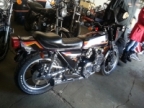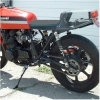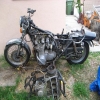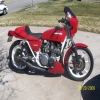Lithium ion batteries
- saxjonz
-

- Offline
- User
-

Registered
- KawboyZ
- Posts: 2113
- Thanks: 76
Re: Lithium ion batteries
09 Apr 2014 15:34
Awesome! Had mine three years, nothing better
79 LTD B3
80 LTD B4 1075 kit JE Pistons .410 cam grind, Bassani, 31 keihin CR Specials...
1980 Z1R, 2002 ZRX1200, 2003 ZRX1200
80 LTD B4 1075 kit JE Pistons .410 cam grind, Bassani, 31 keihin CR Specials...
1980 Z1R, 2002 ZRX1200, 2003 ZRX1200
Please Log in or Create an account to join the conversation.
- DoctoRot
-

- Offline
- Sustaining Member
-

Registered
- Oh, the usual... I bowl, I drive around...
- Posts: 2604
- Thanks: 765
Re: Lithium ion batteries
09 Apr 2014 16:32 - 09 Apr 2014 16:38
i have been doing some reading on regulators because i realized i really knew nothing about them, and i plan on running a lithium battery and dont want to fry it. Here is a forum thread that breaks it down pretty simply. It goes into depth on why a mosfet regulator is preferred to a standard type for lithium batteries. good info here, as it also lists late model bikes that use mosfet regulators and how to tell which are which.
www.superhawkforum.com/forums/knowledge-...fiers-why-how-25117/
www.superhawkforum.com/forums/knowledge-...fiers-why-how-25117/
Last edit: 09 Apr 2014 16:38 by DoctoRot.
Please Log in or Create an account to join the conversation.
- loudhvx
-

- Offline
- KZr Legend
-

Registered
- Posts: 10863
- Thanks: 1622
Re: Lithium ion batteries
10 Apr 2014 01:42There are a few things that I think are missing in that info, and some things that are inconsistent with what I've found.DoctoRot wrote: i have been doing some reading on regulators because i realized i really knew nothing about them, and i plan on running a lithium battery and dont want to fry it. Here is a forum thread that breaks it down pretty simply. It goes into depth on why a mosfet regulator is preferred to a standard type for lithium batteries. good info here, as it also lists late model bikes that use mosfet regulators and how to tell which are which.
www.superhawkforum.com/forums/knowledge-...fiers-why-how-25117/
I don't know why he says the SCR shunting is slow. It's so fast that a scope shows very little trace on a time scale you would use to look at the alternator waveforms. Perhaps he is confusing the fact that an SCR will have a significant forward voltage drop while shunting, which creates the bulk of the heat related to shunting. Most of the heat dissipation during shunting is actually in the stator, not the regulator, but I assume he is only concerned with the regulator heat.
You can see the shunting time is almost instantaneous to the point that the vertical lines are so thin they are almost invisible,
home.comcast.net/~loudgpz/GPZweb/GPZAltn...rnatorWaveforms.html
But the main thing that surprises me about that link is that he seems to be saying that the mosfet regulators shunt the excess current. That defeats the entire reason for using the mosfet's in the first place. I understood the mosfet regulators to be series-pass. That is where they let a pulse of current through to the battery as needed (instead of shunting away the excess current).
He also doesn't really mention the distinction between instantaneous voltage versus average voltage. With pulsing DC voltage you get higher RMS voltage, but the average may be the same as pure DC voltage. So with batteries that need better regulation, you would want to minimize the pulsing so you can know exactly what voltage they are getting all the time. A mosfet would be better suited for that, which is another reason why you would want that over SCR's (which are the type of thyristors he's talking about). However,
using a classic series-pass regulator in this way generates a massive amount of heat in the regulator if the load doesn't need much power. So I assume the motorcycle mosfet regulators are passing entire alternator pulses at a time, instead of actively limiting the instantaneous voltage.
Since the voltage is still pulsing, like that in a shunting regulator output, that leaves the main advantage of the mosfet regulator being that it does not heat the stator windings like shunting does. This means less crankshaft power is dissipated as heat, and more can be used to propel the bike forward instead.
1981 KZ550 D1 gpz.
Kz550 valve train warning.
Other links.
Kz550 valve train warning.
Other links.
Please Log in or Create an account to join the conversation.
- DoctoRot
-

- Offline
- Sustaining Member
-

Registered
- Oh, the usual... I bowl, I drive around...
- Posts: 2604
- Thanks: 765
Re: Lithium ion batteries
10 Apr 2014 03:30
ok well im obviously in over my head here, and I have a few questions. What about the point he was making that SCR type regulators are more prone to be damaged by heat which would make them more inaccurate in the voltage they are passing along? If a mosfet regulator is still pulsing would that negate any benefit that it might have to prolong lithium battery life? are there any types of regulators out there that would be best suited for a lithium battery? Maybe you should get your hands on one and run some of those tests you have on your website. I did find it helpful he showed how to identify the mosfet regulators.
Please Log in or Create an account to join the conversation.
- loudhvx
-

- Offline
- KZr Legend
-

Registered
- Posts: 10863
- Thanks: 1622
Re: Lithium ion batteries
10 Apr 2014 12:26Yes, the SCRs and main rectifier diodes are where the bulk of the heat is being dissipated inside the regulator, but I'm not convinced those are the parts that fail in the early-to-mid 1980's Kaw regulators. In the several kawasaki factory regulators that I've seen fail, it appeared the control circuit is what failed. This is when the control circuit can no longer accurately compare the average battery voltage with a predetermined value. As it warms up, the diodes and SCR's are still rectifying and shunting, but the set voltage just continues to drop.DoctoRot wrote: ok well im obviously in over my head here, and I have a few questions. What about the point he was making that SCR type regulators are more prone to be damaged by heat which would make them more inaccurate in the voltage they are passing along? If a mosfet regulator is still pulsing would that negate any benefit that it might have to prolong lithium battery life? are there any types of regulators out there that would be best suited for a lithium battery? Maybe you should get your hands on one and run some of those tests you have on your website. I did find it helpful he showed how to identify the mosfet regulators.
I believe this is an age-related failure, and not heat, because they were on units that were tested, then stored indoors for 10 or 15 years, then used (and failed).
Historically, SCR's and diodes were the anvils of the active-component world. Giant SCR's are what diesel locomotives use to control their traction motors. It's also why SCR's were used in the first electronic ignitions (at least on Kaws). FETs, on the other hand, have historically been very touchy. You could damage them just by handling them out of the package. That's why I always use a BJT (classic transistor) whenever possible. I've had little experience using mosfet transistors, but the little I had was not encouraging. I think I only had one successful bike-related project using a mosfet, and it was because i used a power mosfet in a non-power application.
home.comcast.net/~loudgpz/GPZweb/Ignition/GPZignitionMod.html
In my opinion, can't compare the reliability of mosfet regulators yet, because we have to look at them in service for 40 years or so, to compare them with SCR regulators. It's interesting that link was on a Honda Superhawk forum. My buddy with the failed mosfet regulators was using them on a Superhawk.
By the way, I believe a mosfet regulator still uses rectifying diodes, at least for part of the waveform, in the design I recall seeing a couple years ago, so it's really only a case of comparing SCR's to mosfets. Of course, there may be many competing designs, but you wouldn't throw in extra mosfets needlessly when diodes can do it for a fraction of the price.
Now it seems I'm arguing against mosfet regulators, but I am not. There is a big advantage in crank efficiency by using a series-pass regulator (versus shunt). And technology may have improved where they are now cost-effective, and reliable enough to be viable, and I'm all for that. But let's not go around saying they will re-grow your hair and shave 30 pounds off the wife.
Now, the big question... lithium battery life. That is one area that will still be hard to say, because there are so many variables. Because they are supposedly so sensitive to their charging voltage, and because there are so many photos on the internet of lithium battery fire carnage, I have stayed away from them, so I don't have a lot of knowledge of what they require.
Batteries like to have different voltages applied for different temperatures. With lead acid, you want the voltage to generally get a little lower as temperatures increase. Some lithium batteries (not on bikes that I know of) actually come with temperature sensors to tell the regulator to increase or decrease voltage accordingly. A generic regulator can only sense the surrounding ambient temperature and make a guess as to what voltage to put out, and doesn't even know what type of battery is being run, and with only one output wire, it can't tell how many amps are going to the battery, and how many amps are being used to run the bike. So even if the regulator could put out a perfectly smooth voltage level, it wouldn't know exactly what that level should be.
When using lead-acid batteries, you want a little bit of pulsing to cover all of the possible voltage levels, and then you let the battery voltage "float" to whatever it wants. Pulsing is exactly how the old-fashioned "float" chargers worked. Now if you raise the pulses, you do force the battery to float a little higher, but only by a percentage of how much you raised the pulses, so it has the effect of reducing the amount of error, in the voltage, a regulator can apply to the battery. It works pretty well as long as you don't leave the battery on the charger for days on end. But i don't know if a lithium battery can be treated the same way. The battery sellers seem to say their batteries can handle it. And how many of those battery-meltdowns weren't the result of failed regulators, and actually due to less sophisticated regulation. And let's not rule out users doing things that help blow up their regulators.
Dealing out (passing) one pulse at a time, or shunting one pulse at a time, is also the most efficient way (without using overly complicated pulse-width-modulation schemes) of regulating, while minimizing (but not eliminating) the heat dissipation in the regulator. Because I assume the mosfet regulator deals in pulses, I assume it also must have pulsing similar to what I showed in that earlier link, but as I explained above, we don't really want to get rid of all pulsing, at least, for the battery's sake.
So, yes, if I ever get a mosfet regulator, i'll make some measurements to see if it's different in any significant way, other than crank efficiency.
1981 KZ550 D1 gpz.
Kz550 valve train warning.
Other links.
Kz550 valve train warning.
Other links.
The following user(s) said Thank You: Patton
Please Log in or Create an account to join the conversation.
- wagonmaster69
-

- Offline
- User
-

Registered
- 78 KZ1000A2 / 82 KZ1100 Spectre
- Posts: 696
- Thanks: 4
Re: Lithium ion batteries
09 May 2014 23:59 - 10 May 2014 00:00
Hey OZ.ZR1 does the bike keeps it charged?
78 KZ1000 work in progress in Hacienda Heights California and a 82 KZ1100 Spectra And a 1992 ZX11.
Last edit: 10 May 2014 00:00 by wagonmaster69.
Please Log in or Create an account to join the conversation.
- Medicontheloose
-

- Offline
- User
-

Registered
- Posts: 36
- Thanks: 1
Re: Lithium ion batteries
18 May 2014 10:15
I'm curious about that hobby battery as well. Does the stator keep it charged?
"That others may live."
1980 KZ750E
1980 KZ750E
Please Log in or Create an account to join the conversation.
- 0Z.Z1R Mk2
-
- Offline
- User
-

Registered
- Posts: 309
- Thanks: 31
Re: Lithium ion batteries
19 May 2014 15:47Dam good question!wagonmaster69 wrote: Hey OZ.ZR1 does the bike keeps it charged?
All I can tell you is its been in the bike for 12 trouble free months.
I do use a balance charger once a moth.
1976 KH 500 triple
1978 Z1R D1
1980 Z1R MK2
1983 Gpz750 turbo
2007 ZRX 1200r
1982 GSX 1000S Katana
1983 GSX 1000S Katana
Don't knock my turbo lag - it gives your naturally aspirated a chance..
1978 Z1R D1
1980 Z1R MK2
1983 Gpz750 turbo
2007 ZRX 1200r
1982 GSX 1000S Katana
1983 GSX 1000S Katana
Don't knock my turbo lag - it gives your naturally aspirated a chance..
Please Log in or Create an account to join the conversation.
- tachrev
-

- Offline
- User
-

Registered
- Rubber Side Goes Down
- Posts: 338
- Thanks: 11
Re: Lithium ion batteries
20 May 2014 06:160Z.Z1R Mk2 wrote:Dam good question!wagonmaster69 wrote: Hey OZ.ZR1 does the bike keeps it charged?
All I can tell you is its been in the bike for 12 trouble free months.
I do use a balance charger once a moth.
I don't see why it wouldn't charge it as well as it would charge any other Lithium Ion battery (ballistic,shoria,etc). Balance charging will help it live as long as possible.
I love my ballistic, and it seems to charge fine, but when it finally goes I will probably try out one of the cheaper hobby batteries like the one you are using. Cranks FAST, is tiny, and weighs about 1.5lbs.
I've had it for about 2 years, I think.
1977 Kawasaki KZ1000 : Street/Strip
Build Thread
Build Thread
Please Log in or Create an account to join the conversation.
- baldy110
-

- Offline
- User
-

Registered
- Posts: 2272
- Thanks: 512
Re: Lithium ion batteries
20 May 2014 12:07
I've been running a ballistic lithium ion battery in my KZ1000R for 3 years now. Havent charged it since I bought it. It just leave it alone during the winter months and it fires right up in the spring. The bikes charging system keeps it charged fine.
The following user(s) said Thank You: saxjonz
Please Log in or Create an account to join the conversation.
- bountyhunter
-

- Offline
- User
-

Registered
- Posts: 7245
- Thanks: 338
Re: Lithium ion batteries
20 May 2014 12:27 - 20 May 2014 12:29
Be advised; the "hobby" batteries are Lithium Polymer (Li Po) and the batteries made for motorcycle and car use are Li Fe PO4 (Lithium Iron Phosphate). The LiPo batteries are the ones that like to catch fire and even explode, don't think I would want one residing between my legs three inches below the family jewels.
1979 KZ-750 Twin
Last edit: 20 May 2014 12:29 by bountyhunter.
The following user(s) said Thank You: Tomolu5
Please Log in or Create an account to join the conversation.
- tachrev
-

- Offline
- User
-

Registered
- Rubber Side Goes Down
- Posts: 338
- Thanks: 11
Re: Lithium ion batteries
20 May 2014 13:17bountyhunter wrote: Be advised; the "hobby" batteries are Lithium Polymer (Li Po) and the batteries made for motorcycle and car use are Li Fe PO4 (Lithium Iron Phosphate). The LiPo batteries are the ones that like to catch fire and even explode, don't think I would want one residing between my legs three inches below the family jewels.
Good point...I had forgotten about that.
1977 Kawasaki KZ1000 : Street/Strip
Build Thread
Build Thread
Please Log in or Create an account to join the conversation.
Moderators: Street Fighter LTD

